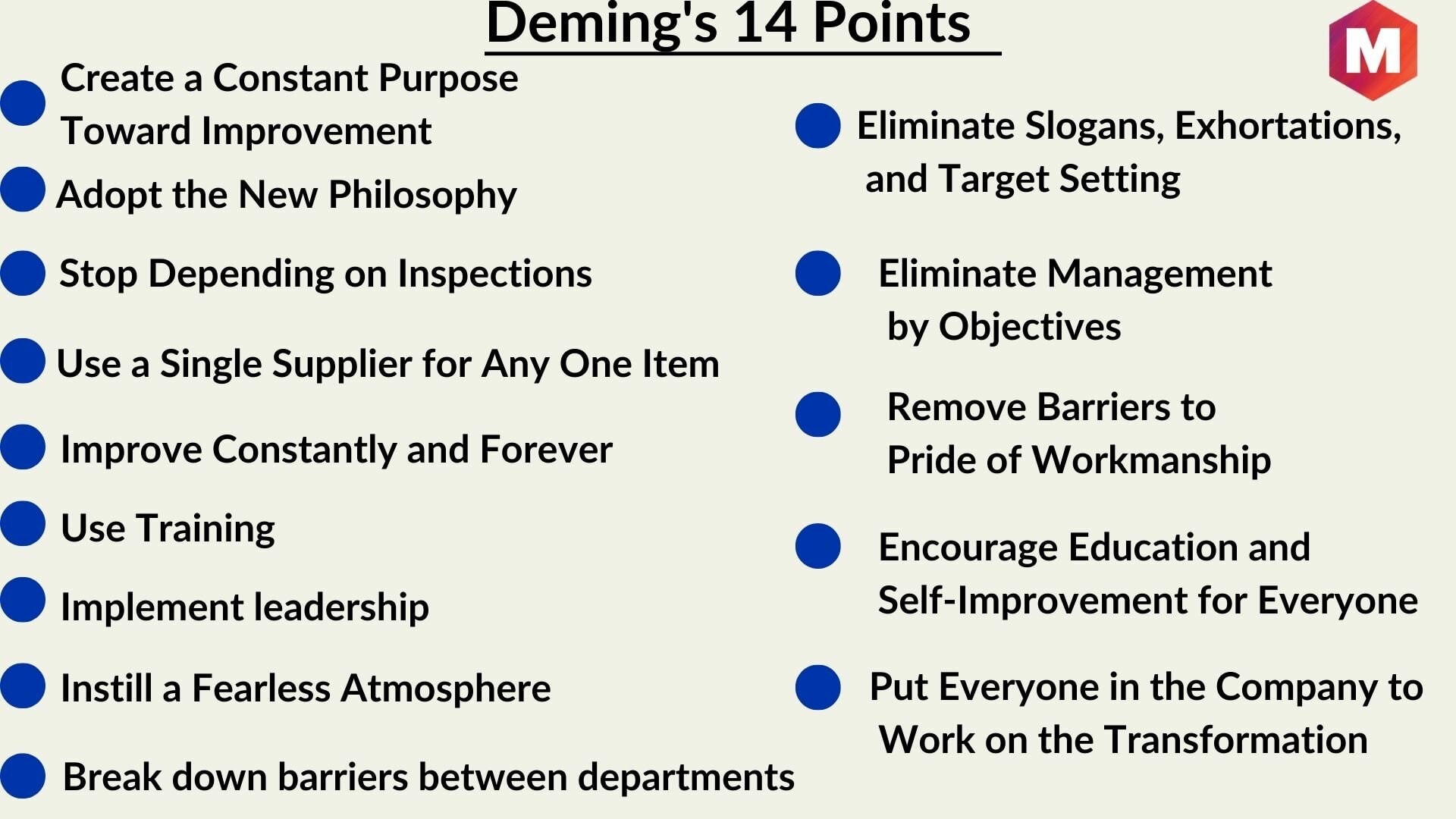Table of Contents
What are Deming’s 14 Points?
Deming’s 14 Points of Management are principles for transforming an organization from its current form to one of optimization and efficiency. They are the basis for continuous improvement and quality management. Based on his experience working with industries in the United States, Japan, and other countries, Deming created 14 points that organizations could use to improve quality and performance.
These 14 points are the fundamental points for changing the [American] industry. 14 principles are a signal that management tends to continue operating and protect investors and jobs. Such a mechanism formed the basis for training for Japanese top management in 1950 and subsequent years.
Who was Dr. W. Edwards Deming?
William Edwards Deming was an American statistician, professor, author, lecturer, and management consultant. He is perhaps best known for his work in quality management, which he helped to develop while working in the industry in the United States during the 1940s and 1950s.
During World War II, Deming was a member of a team that designed and developed statistical methods for sampling radio tubes being manufactured for the military. After the war, he worked as a consultant to help Japanese businesses improve their quality and performance.
In 1950, he published a paper titled “Some Theory of Sampling” which outlined his ideas on statistical quality control. These ideas formed the basis for what is now known as Deming’s 14 Points.
Why use Deming’s Points of Management?
Managers may benefit from Deming’s ideas by identifying and correcting organizational characteristics that prevent progress.
All of the ideas are revolutionary, with a focus on leadership and quality assurance. The concepts developed by Deming and other leading thinkers apply to any size or form of company. Following the principles is necessary in order to implement a comprehensive management strategy that incorporates systems and people.
The application of Deming’s 14 Points of Management has led to increased quality and productivity in organizations around the world. The principles outlined by Deming can be applied to any organization, in any industry, to help achieve quality and productivity.
Deming’s 14 Points of Management
1. Create a Constant Purpose Toward Improvement
The first step is to set a goal for the organization and everyone in it. The purpose should be something that unifies everyone in the company, such as improving quality or becoming the market leader. Once the purpose is established, it should be communicated to everyone in the organization.
The constancy of purpose is about long-term systems thinking and continuously focusing on improving products and services. Rather than focusing on short-term solutions to current problems, organizations take a long-term approach, think strategically and allocate resources to research and education. Constantly cultivating innovation and placing customers first helps build trusting relationships and ensures an organization remains competitive and successful.
Long-term systems thinking and a continued focus on improving products and services are at the heart of the constancy of purpose. Instead of focusing on immediate solutions to current issues, businesses take a long-term viewpoint, considerationally plan ahead, and invest in research and education. Constant innovation development and putting consumers first assists in establishing trust relationships while also ensuring that an organization is competitive, successful, and result-driven.
2. Adopt the New Philosophy
For an organization to improve, everyone must change the way they think about their work. The new philosophy is based on Deming’s 14 points, which emphasize quality, teamwork, and constant improvement.
This point is all about getting buy-in from employees. In order for an organization to improve, everyone must be on board with the new philosophy. This means that management must lead by example and create an environment where employees feel comfortable trying new things and making mistakes.
3. Stop Depending on Inspections
Inspections are often used as a quality control measure, but Deming believed that they were actually counterproductive. He argued that inspections should be replaced with statistical methods that focus on preventing defects.
This point is about preventative measures rather than corrective measures. By focusing on prevention, organizations can avoid many of the problems that arise from defects. This requires a shift in thinking from inspection to quality control.
4. Use a Single Supplier for Any One Item
Deming believed that organizations should develop long-term relationships with suppliers in order to ensure quality and avoid disruptions in the supply chain. He also argued that businesses should only use one supplier for each item, rather than trying to source from multiple suppliers.
By having a single supplier for each item, businesses can avoid many of the problems that arise when multiple suppliers are involved.
5. Improve Constantly and Forever
Organizations must continuously strive to improve their products and services. This requires a never-ending commitment to quality and constant innovation.
This point is about always improving and never being satisfied with the status quo. Organizations must continuously strive to improve their products and services. By constantly improving, businesses can maintain a competitive edge and ensure customer satisfaction.
6. Use Training
All employees should receive training that is specific to their jobs. This will help them understand the organization’s goals and how their work fits into the larger picture.
This point is about giving employees the training they need to be successful in their jobs. By providing employees with adequate training, businesses can improve efficiency and quality.
7. Implement leadership
One of Deming’s most famous quotes is, “Leadership is not a rank to which you are promoted. It is a choice you make.” He believed that anyone in an organization can be a leader, regardless of their position.
This point is about leadership being something that comes from within. Leaders are those who take initiative and inspire others to do the same. By encouraging leadership at all levels, businesses can create a culture of innovation and improvement.
8. Instill a Fearless Atmosphere
Fear is one of the biggest obstacles to quality and improvement. Deming believed that employees must feel comfortable speaking up and offering new ideas. This can only happen if they feel safe from retribution. Employees should feel free to voice their opinions and share ideas. This open atmosphere will foster creativity and innovation.
This point is about creating an environment where employees feel free in sharing their thoughts. By creating a fear-free environment, businesses can encourage creativity and improve overall quality.
9. Break down barriers between departments
Deming believed that silos between departments hinder quality and collaboration. He argued that businesses should break down these barriers so that employees can work together more effectively. This will help to ensure that everyone is working towards the same goal.
This point is about breaking down barriers between departments. By breaking down these barriers, businesses can improve communication and collaboration.
10. Eliminate Slogans, Exhortations, and Target Setting
Slogans are often used in an attempt to motivate employees. However, Deming believed that they are ineffective and can actually demotivate employees. Slogans, exhortations, and target setting are often counterproductive. They create an environment of fear and mistrust.
Hence, this point is about eliminating slogans, exhortations, and target setting. By eliminating them, businesses can improve communication and trust.
11. Eliminate Management by Objectives
Deming believed that management by objectives is an ineffective way to manage employees. He argued that it creates a feeling of competition and mistrust between employees.
This point is about eliminating management by objectives. Deming believed that it creates a feeling of competition and mistrust between employees. By eliminating this practice, businesses can improve communication and trust.
12. Remove Barriers to Pride of Workmanship
Employees should be proud of the work they do. This requires removing any barriers that prevent them from taking pride in their work.
This point is about creating an environment where employees can take pride in their work. By removing these barriers, businesses can improve employee morale and motivation.
13. Encourage Education and Self-Improvement for Everyone
Deming believed that businesses should encourage employees to learn and grow. This can be done through education and training programs. Businesses should also provide opportunities for employees to improve their skills.
This point is about encouraging education and self-improvement for everyone. By encouraging education and self-improvement, businesses can improve employee morale and motivation.
14. Put Everyone in the Company to Work on the Transformation
Deming believed that businesses should involve everyone in the quality improvement process. Everyone should be aware of the goals and objectives. They should also be involved in the planning and implementation of quality improvement initiatives.
This point is about involving everyone in the quality improvement process. Everyone should be aware of the goals and objectives. By involving everyone in the process, businesses can improve communication and collaboration. This will help to ensure that everyone is working towards the same goal.
Effectiveness of Deming’s 14 Points for Management
Deming’s 14 points are effective in resolving low-quality issues and improving management communication.
Deming’s 14 points are a set of management principles that Deming argued would result in increased quality and productivity. The points were first presented in Out of the Crisis, Deming’s book on quality management and statistics.
Annual or merit rating systems are often seen as Deming’s most controversial point. Deming argued that these systems foster a “blame the worker” mentality and lead to lowered morale and quality. Instead, Deming proposed that management should focus on improving the system and processes, rather than on finding fault with workers. Western management styles often emphasize individual achievement and individual accountability. Deming argued that this style of management is counterproductive in a quality improvement context. Instead, he advocated for a “team” approach, where workers are seen as part of a larger system and are encouraged to work together for the good of the whole.
Open and honest communication is essential for Deming’s 14 points to be effective. Deming believed that managers should share information openly with workers and that workers should feel free to share their ideas and concerns with management. This open and honest communication will help to identify problems early on and prevent them from becoming larger issues.
An internal customer is someone who receives a product or service from another department within the same company. Deming argued that it is important to treat internal customers with the same respect and care as external customers. Awarding business should be based on quality, not quantity. Deming argued that awarding business to the lowest bidder often results in lower quality products and services. Instead, Deming proposed that businesses should be awarded based on their ability to produce high-quality products and services.
Conclusion!
Deming’s 14 points are a set of guidelines for businesses to improve quality. They are based on the principles of continuous improvement and employee involvement. By following these guidelines, businesses can encourage employee creativity and improve overall quality.
In total, Deming’s 14 Points can be summarized into four main categories: institute leadership, Constantly Decrease Costs, Institute Training, and Quality Management Systems.
Institute leadership must be committed to the constant improvement of the institute. They must also provide resources and support for employees to engage in learning opportunities. Constantly Decreasing Costs is Deming’s way of saying that quality should be a priority for businesses. By decreasing costs, businesses can increase profits and provide better products and services to customers.
Institute Training helps employees understand the Deming philosophy and how to put it into practice. Employees need to be properly trained in order to implement Deming’s 14 Points effectively. Quality Management Systems are Deming’s final point. He argues that businesses need to put in place quality management systems in order to ensure that products and services are of the highest quality.
Deming’s 14 Points are a great starting point for businesses who want to improve their quality and decrease their costs. By following these points, businesses can create a quality management system that will improve their products and services and increase their profits.
Liked this post? Check out the complete series on Management

